- A Testament Against Terror
- Text by Charles Weng
- Photos Courtesy of Associated Press and Reuters
Please note: At the time some of these essays were written, the death toll in lower Manhattan was estimated to be 5,500 or above. That number has been lowered to 3,900 or so by late November of 2001.
11th September 2001: The Day the Terrorists Won
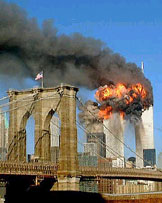 Chris Kosachuk / Reuters
Chris Kosachuk / Reuters
|
|
On
the morning of Tuesday, 11th September of 2001, four passenger
planes on domestic flights in the U.S. were hijacked to perpetrate the
worst terrorist attack in American history. Two planes crashed into the
World Trade Center buildings in New York, utterly destroying the twin
skyscrapers and exacting a catastrophic toll in casualties. Another
crashed into the Pentagon building in Washington DC and a fourth into the
countryside near Pittsburgh, also with devastating effects. All aboard
American Airlines Flights 11, 77 and United Airlines Flights 93 and 175
perished. |
|
|
No words can do justice for the human lives lost or
grievously affected. For many people around the world, their view of the world
has been irrevocably changed for the worse. This must not be. If you have a legitimate cause of protest, make your voice heard peacefully. Once you commit violence, the world dismisses your message and sees you only as a threat, returning violence in kind. Contact your national government
officials to learn their positions on international relations. Urge them
to exhaust every diplomatic resource to resolve conflicts around the world
peacefully. It is no longer naïve to believe that, soon, people will be free to make their presence known in every corner of human civilization, if only to carry on the most common aspects of their complex, inter-connected lives. This is evident in the fact that many Europeans now commute daily across borders, that practically everything you consume comes from another country – that someone is browsing this site from an Internet café in Bombay. Yet one must hope that the global mobility of people, goods and ideas will not simply lead to mercantilism, colonialism or commercial assimilation (i.e., rich countries exploiting poor countries), as it has been for the past three hundred years. Respect of diversity and self-determination is not just a politically correct slogan; it is a necessary means of existence in the twenty-first century, whose first nine months do not seem very promising to many. I grieve for what happened in New York, Washington and Pennsylvania, not just for the horrific loss of life but also for the fear, anger and mistrust we survivors must inevitably sustain regarding our shaken places in the world. The terrorists have indeed won on this dark day; they made this planet a more foreign, sinister place. |
||
12th September 2001: The Shock Lingers
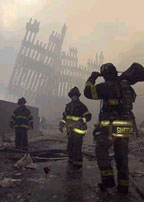 Mark Lennihan / Associated Press
Mark Lennihan / Associated Press
| One does not think too well in shock. One
acts, and reacts, and collects his impressions to be fully understood in another
time.
In New York, legions of firefighters, police officers and volunteers risk their lives around the clock to save the all too miraculous few, trapped in the treacherous white heap. Hundreds line up to give blood. The mayor asks for 6,000 body bags. He’ll get more. |
||
|
|
In Washington, the bulwark of American military might is still smoldering. The politicians rattle their swords, declaring war against enemies swiftly identified by an uncannily efficient coalition of law enforcers. In Pennsylvania, the incessant media now report of last-minute heroism aboard a doomed flight. Passengers set aside recognition of their certain demise to thwart their hijackers, preventing the plane from harming anyone on the ground. |
|
|
In California, the churches are full again. Los Angeles, once more, endures the plight of loved ones not returning home on scheduled flights. They remember the plane that fell from the sky off Ventura Harbor nearly two years ago. I remember my friend, Mike, who never makes it back from Taipei last Thanksgiving. Grieving co-workers, exhausted rescue workers, reporters losing their voice and composure before national television, stranded travelers, all in disbelief and dismay… One can only wonder what now transpires in the now-forbidden streets of Kabul, Afghanistan, haunted by weary soldiers yet to finish their endless wars amongst neighbors and brothers, ere they embrace the wrath of the West not seen since the armies of Alexander. |
||
13th September 2001: Regarding Our Enemies
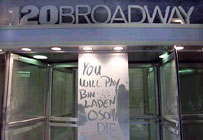 Shannon Stapleton / Reuters
Shannon Stapleton / Reuters
| Before I go on with today’s reflections, I
must repeat my prayers for the many, many that perished, their families, and for
the sleepless firefighters, paramedics, rescue volunteers, police officers,
journalists, counselors, ministers, blood-givers and well-wishers, whose
presence on television redeem the persistent images of utter horror and evil –
of two airplanes flown deliberately into the twin towers of lower Manhattan.
It is well that I reserve the better part of my faculties to recognize the good in us all in the face of calamity. What I now contemplate involves darker emotions – of anger, hatred and nihilism. |
||
|
Even after a year or more of residing in the U.S., the terrorists still failed to grasp the absurdity of their hatred towards America. |
Of late, suicide bombers have been constantly appearing in the news just prior to September 11th. The Tamil Tigers launch them as “live ordnance” while assaulting the Sri Lankan army. Hamas leaders tell their prospective “martyrs” that they are actually providing a service for their Israeli victims, whose innocent souls would be hastened to heaven, lest they bring damnation upon themselves by persecuting the Palestinians. Deplorable as these actions are, the twisted logic here can be understood in terms of zeal and desperation. The bombers, fighting for a homeland long denied to them, have absolutely nothing to lose. | |
|
How does one explain the antipathy felt by the September 11th hijackers towards their perceived adversaries? Now, it’s easy for an Arab in the Middle East to hate America; all he sees there are the American-made weapons Israelis use against the Palestinians, the warplanes over the skies of Iraq, the American warships anchoring at their shores, and television programs via satellite that defy fundamentalist Islam’s puritanical tenets. The hijackers lived for a year or more inside the United States from Maine to Florida, taking flight lessons. How could they not be affected during this time by the open society they easily infiltrated? They had surely enjoyed the unfettered access to information, the integration of diverse communities, the tolerance of dissent, and the freedom to travel great distances – what grievances did they ever have against such blessings? Did they not already see this country steeling its resolve since Oklahoma City and the car bomb attack on the World Trade Center – that we Americans would not be intimidated by acts of terrorism on our own turf? Did they not understand they were perpetuating the ugly Arab stereotype as hate mongers and terrorists? Innocent Arab-American citizens and American Muslims -- and Sikhs, who wear turbans and long beards -- are once again victims of hate crimes, harassed and even murdered by upset neighbors acting on the vilest of their irrational instincts. If the hijackers had minds of their own, they surely would see the utter futility of their diabolical plots, serving no purpose other than to fulfill the wishes of their remote overlords – back in the Middle East bunkers, waging ideological vendettas of their own design, taking credits of heroism for the dastardly exploits of their suicidal underlings. What grievances does Osama Bin Laden have against America? He is not a Palestinian, living precariously in lands forcibly occupied by Israel. He is not a Libyan, a Syrian, an Iraqi or an Iranian, repressed by the West for the indiscretions of unscrupulous leaders. He is a Saudi patrician, spoilt by a multi-million inheritance and aided by the CIA during the presumptuous proxy war between the United States and then-Soviet Union over the wastelands of Afghanistan. With a private army of clandestine warriors, he fights a jihad not out of desperation, but in pursuit of glory disguised as puritanical zeal, and fueled by regional resentment towards the U.S. military presence around the Arabian Peninsula, deployed for causes that were not his own to begin with – protection of Kuwait, peacekeeping in Somalia. It is false reassurance to believe that one knows his enemy so well. Even after a year or more of residing in the U.S., the terrorists of September 11th still failed to grasp the absurdity of their hatred towards America. Our enmity towards terrorism at large will have no such conundrum. |
||
15th September 2001: Are We Better Than the Russians?
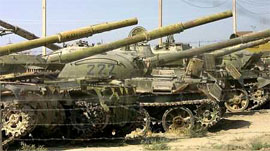 Efrem Lukatsky / Associated Press
Efrem Lukatsky / Associated Press
|
As our country prepares for war against radical Arab terrorists and those harboring and abetting them, the inevitable scenario now is a war in Afghanistan. Saying it’s a daunting task is barely an understatement. Not since Alexander, Genghis Khan and Tamerlane could a foreign army even touch the Afghanis: not the Ottoman Turks, the British Raj or the Russians. Especially the Russians. Never mind for a moment that they lost nearly 15,000 soldiers supporting a communist regime in Kabul during the 1980s, in what proved to be the last campaign of the Cold War -- which, incidentally, also became the proving grounds of Osama Bin Laden's followers, then "holy warriors" funded and trained by the CIA. It is particularly poignant to see what the Russians tried to do almost immediately afterwards, in the Caucasus. Their first effort to quell the insurgency in Chechnya ended also in failure, and for a short while the Chechens enjoyed a de facto sovereign state, with Grozny as its capital. |
||
|
Before we go to war, we must ask difficult questions to assess our prospects, even if they seem to challenge our honor and resolve. |
Forerunning presidential candidate Vladimir Putin, finding a cause to rally a citizenry mired in economic hardship and political dysfunction, dared his ailing nation to fight yet another war against the Chechen rebels. Now that Russia is a democracy, public opinion mattered; Putin advocated an on-schedule, low-casualty campaign that called for massive aerial bombardments, emulating the Gulf War and the NATO operations in Yugoslavia. | |
| Granted, the Chechens at first were
guerillas, not terrorists, the distinction being that guerillas engage enemy
soldiers in hit-and-run skirmishes, while terrorists target unwary civilians in
stealth. Chechen bases were hidden in the primitive, mountainous terrain of
their homeland, closely resembling the harsh landscape of Afghanistan. Their
battlefields were the few worn-torn cities left standing since the last war,
mostly in the streets of the ruined capital. Afghanis exchanging rockets and
machine gun fire in tattered Kabul could identify this experience firsthand.
After much fighting and gross injustice inflicted upon the Chechen civilians, the Russian army did retake Grozny. Yet they did not completely defeat a rebel force that simply regrouped by blending back into their towns and villages, eluding suspicious Russian garrisons that regularly hunted down any man of fighting age. Relinquishing guerrilla warfare for the time being, the rebels now turn to terrorism, learning from their newfound friends amongst the Islamic militants how to plant bombs in apartment buildings and subway stations in the very heart of Moscow. Meanwhile, bombed-out Grozny is left to rot, turning its remaining residents into scrap peddlers and beggars – misery of medieval proportions. The parallels between the war Putin has yet to finish and the war Bush is about to start are not exact, but they are considerable. Both nations have suffered greatly at the hands of their enemies: the Russians through protracted attrition, the Americans in singular moments of abject terror. Both presidents justify their war cries as a matter of national security, and command the support of their people. Both leaders represent predominantly Christian nations, and thus project a perilously provocative image of waging a latter-day crusade against the Islamic world -- to which the bearded Mullahs would only respond with more jihads and fatwas to slaughter Americans. Will we, with our superior technology and resources, prevail in a conflict half a world away, while the Russians stumble before their own borders? Will we also languish in Afghanistan despite initial successes of incursion? Will we become as ruthless and irresponsible towards the ordinary Afghan people – impoverished, disenfranchised citizens who have no say over the exploits of Osama Bin Laden or the Taliban, but are expected for centuries to defend their homeland valiantly against overwhelming odds – as the Russians have been towards the Chechens? Will our military actions abroad only provoke more terrorist reprisals back home, as the Muscovites have so painfully experienced? Debate is an integral part of our democracy. Before we go to war, we must ask difficult questions to assess our prospects, even if they seem to challenge our honor and resolve. No one wants to lose, certainly not the underdogs of Chechnya or Afghanistan. Up to now, they haven’t. |
||
16th September 2001: Towards a Greater Peace
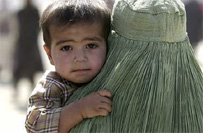 Laura Rauch / Associated Press
Laura Rauch / Associated Press
I now know what it’s like to stand at the proverbial crossroads, making a deal with the devil. Having marched in Washington, DC and Los Angeles to protest our country’s proxy wars in the 1980s and the Gulf War a decade later, I now decide to support our war against the terrorists. Oh, pity not the wayward soul of this erstwhile pacifist. Many, many people in New York, Washington, California, across this country and around the globe have graver concerns weighing on their hearts: we lost family members and friends, jobs and savings, a collective sense of security. It’s not as though my decision was difficult, or wrong. The civilized world needs to defend itself against suicidal fanatics whose recalcitrant enmity towards Israel, America and secular Arab regimes (i.e., anyone who isn't an Islamic fundamentalist of their particular sect) leaves no regard for human lives whatsoever; it is a fight long overdue. |
||
|
We must reform our national policy to recognize and counteract the very causes of anti-American sentiments in the Muslim world. |
Yet, in this Faustian pact, I have my terms for my tacit agreement to the sordid business of revenge. I will demand my satisfaction from this war. If our campaign against terror is to be total and resolute, it must be more than dropping “smart bombs” and sending the marines to yet another exotic battlefield. We must reform our national policy to recognize and counteract the very causes of anti-American sentiments in the Muslim world – anything that would prompt even the most moderate of Arabs to think that our profound tragedy on the 11th of September was a “comeuppance.” |
|
|
We must drag the Israelis and the Palestinians to the negotiation table one last time, making sweeping, unprecedented compromises to end their yearlong conflict. Convince Jewish settlers to return their occupied lands to proper owners – compensate for their trouble of displacement by all means. Disarm the civilian population, Israeli and Palestinian. Make the holy sites of Jerusalem a neutral zone under international stewardship. Advise the Palestinians to create an accountable, constitutional government, and persuade them to build their national capital in Ramallah, not East Jerusalem. Endow both sides with largesse for redeveloping the region. We must mend and renew our friendships in the Muslim world. End sanctions and “no fly zone” interdictions against Iraq, and resume rapprochement with Saddam, our former enemy number one, provided he is not implicated as a terrorist conspirator. Give generously to the Iraqi people, both the Sunni majority and the Kurdish minority to the north, and the Shi’ites of the south. Reassure Kuwaitis of their national security. Promise the Taliban – or whoever left to fill the Afghan power vacuum after we conclude our business with Bin Laden – that we will rebuild their country. Build factories – create jobs – from Indonesia to Morocco, from Uzbekistan to Sudan. Rebuild mosques in Bosnia. At home, we must withhold judgment when people assert their world view in the austere terms of their religion. Maintain a constructive dialogue among the different faiths, especially between Christian and non-Christian congregations. Prosecute hate crimes with due fervor. Are these things too much to ask in exchange of my predisposition towards peace? No, they are not. If they can bring about a greater peace, a world free from terror, I can live with myself – and none of the thousands perished on Black Tuesday will die in vain. |
||
19th September 2001: La La La La Life Goes On
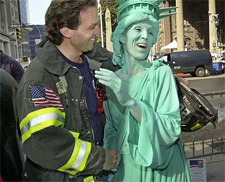 Kathy Willens / Associated Press
Kathy Willens / Associated Press
|
I stayed close to my sister, my personification of hope, continuity and normalcy. |
As we drove home today, my
sister stopped by the local Toys 'R' Us to buy presents for her friends' kids,
who are approaching their young birthdays. The venue I frequented for years,
where I indulged much of my vestigial adolescence in PlayStation games and Star
Wars collectibles, was closing down: all the video games and bikes had been
relocated to other stores and what's left of the dregs, littered all over the
place, was on a clearance sale at 40% off. |
|
|
I felt like a looter. Local
parents, strollers and whining youngsters in tow, descended upon the chaotic
aisles, gleaming whatever they could from the heaps of out-of-fashion fads and
ill-conceived merchandising schemes (how many more likenesses of professional
wrestlers on lunch boxes can one take?). 5,000 people were murdered
last Tuesday. Typhoon Mari flooded Taipei. My portfolio lost 75% of its value
since January 2000 and the nation is going to war. My sister is buying Pokemon
paraphernalia for other people's children. I sank into a chair, dazed and
depressed. I felt somewhat better afterwards, when we sat at a familiar table in our neighborhood for sesame-coated bread and hearty soup in a clay pot – at an Islamic Chinese restaurant. I stayed close to my sister, my personification of hope, continuity and normalcy, as we went to the market later for milk. |
||
26th September 2001: A Traveler's Lament
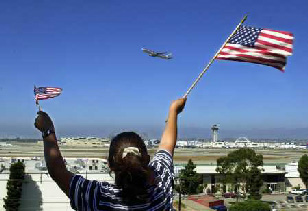 Reed Saxon / AP
Reed Saxon / AP
|
It seems so long ago. Back in July, on an early Sunday morning, I took a leisurely bus ride from Trondheim, Norway to the regional airport, enjoying the fjordland scenery along the way and thinking I’d still have time for a smorgasbord breakfast. Then, upon check-in, I learned that my scheduled flight was cancelled, and the only remaining flight to Oslo to meet my homebound connections to Amsterdam and Los Angeles was leaving its terminal. Two Braathens staffers leapt from the counter and scrambled me all the way to the plane’s closing door, bypassing security if there were any. |
||
Let our jets soar ever more, bringing souls of goodwill and adventure safely to a brave new world. |
Los Angeles International Airport, or LAX – once the appropriate call sign for a destination famed for the laid-back imagery of palm tree silhouetted against an eternal sunset – is now a garrison. The already-daunting gauntlet between a remote parking lot and a terminal is now choked with checkpoints, creating the human equivalent of an upstream salmon run. It’s where all feel the pain along the way, but fewer will actually have any satisfaction at the journey’s end. | |
|
Indeed, somewhere between the mere loathing of unpracticed airport security and the morbid fear of boarding another doomed flight, there is the dread of having no plane to get on at all. In reaction to sharply curtailed demand, airlines now announce five-figure layoff numbers and up to 20% reduction of service. Swissair is insolvent, likely rendering direct flights between the US and Switzerland a fond memory for a while. Even with a federal bailout, United Airlines and American Airlines – the two largest in the country – fear they would tread the same plank walked by the once-mighty Pan Am, which bowed out shortly after suffering a terrorist attack just above Lockerbie, Scotland. Now,
more than ever, I covet those giddy Fridays when I leave midday from the
office, casually beating the rush hour traffic to hop on a 747 – and to
find myself standing on the cobbled streets of the Old World the following
afternoon. Granted,
there are many things that will compensate for the loss of yet another
trans-oceanic holiday. I am
grateful for the family members and friends who remain in touch. I am proud of a nation that stands united in the face of calamity.
I still continue to roam about my
home state of California, keeper of the planet’s tallest, largest and
oldest living things (coastal redwoods, sequoias and
bristle-cone pines), the highest peak in the 48 contiguous states (Mt
Whitney), and the lowest point in North America (Death Valley). At the least, I can certainly
shore up my savings, to brave an economy that has been ailing for more
than a year. Yet,
as a perennial traveler, I definitely feel quite amiss. My love of the
world and my freedom to appreciate its many splendors in first person have
been egregiously compromised. While I sustain no grievous injury, as do
the loved ones of nearly 5,500 people who perished in September, that
which makes me who I am as a person is made a bit less so. God bless America. Let our jetliners soar ever more, bringing souls of goodwill and adventure safely to a brave new world. |
||
11th October 2001: Hard Lessons
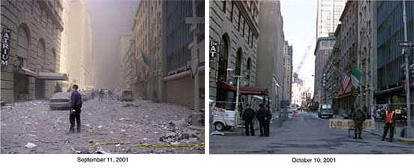 Bernadette Tuazon (left), Richard Drew
(right) / AP
Bernadette Tuazon (left), Richard Drew
(right) / AP
|
It’s
been a month now. The
unbelievable nightmare that seemed to have happened only yesterday is now a daily
malaise. Our
ongoing drama of terror, so well scripted by circumstance since September
11th, opened its second act last Sunday in true Shakespearean
form. The three chiefs – George Bush, Tony Blair and even a stone-faced
Osama bin Laden in a pre-recorded but perfectly timed statement –
delivered their oratories of war on television. Meanwhile, our missiles and bombs
– mixed with a paltry pittance of food – rained prodigiously from the
skies of drought-stricken Afghanistan, almost redundantly retarding the
primitive militia of the Taliban and terrorizing the civilians who have
yet to flee to the borders. People rioted in Pakistan, Palestine and
marched in protest throughout the Muslim world, angry over such a direly
disproportionate contest of will between the world’s richest and poorest
nations, even more so over their own governments’ tacit support of
Western infidels. |
||
|
We learned that true heroes -- our martyrs -- die quietly in the uniforms of firefighters, police officers and paramedics. |
Back
at the home front, the list of threats to the way of life we once knew –
layoffs, failed investments, curtailed travels and sacrifice of civil
liberties for greater security – grows by the day.
Someone was spreading anthrax germs at a tabloid newspaper’s office in
Boca Raton, Florida, killing a man and infecting two others in a place
only minutes away from where several suicidal hijackers lived, took flying
lessons and inquired about crop-dusting planes. The
bright side of it all, also as necessitated by circumstance, is a
lessening of complacency and ignorance amongst us all. |
|
1. We learn that true heroes -- our martyrs -- die quietly in the uniforms of firefighters, police officers and paramedics. Their presence on our television screens, where we usually idolize those earning millions in sport arenas and movie studios, injects a much-needed shot of humility in the hyper-commercialized vanities of our popular culture. 2. By seeing our civil liberties compromised to bolster law enforcement, we begin to take our Bill of Rights more seriously, and never for granted. 3. We realize that America does not stand alone in the world. Before September, the current U.S. administration alienated the global community by rejecting the Kyoto Protocol to reduce greenhouse gases, abandoning the Anti-Ballistic Missile Treaty in an unilateral pursuit of a missile defense system, and above all, its relative lack of initiatives in resolving the violent conflict between Israelis and Palestinians, now in its second year. The terrorists certainly will not help us in any of those matters, but they do remind us, in the cruelest manner possible, that actions (or absence thereof) serving our national interests do have global consequences, and that even the richest and most powerful nation on earth is still in need of friends. 4. As we open our minds to the great religion of Islam despite those who commit atrocities in its name, we reflect upon the West’s own lamentable history of subverting ideology in the service of genocide: the Crusades, the Spanish Inquisition, the witch hunts of colonial America, the Holocaust. We will no longer tolerate any repetition of such grave crimes against humanity: not in the Balkans, central Africa or anywhere in the Muslim world. 5. At the very least, there is yet another war-induced lesson in world geography: those who may not even be able to name all fifty states now know every country that borders Afghanistan (Pakistan, China, Tajikistan, Uzbekistan, Turkmenistan, Iran), at least until the conflict’s end. Our
hard-won enlightenment may not directly contribute to our war against
terrorism abroad, or our safety at home, but it does add meaning to these
uncertain, frightful days we now lead, amid the lingering ashes of
lower Manhattan. |
||
21th October 2001: Still Tuned In
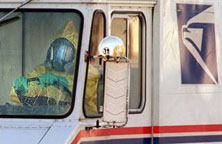 Kamenko Pajic / Associated Press
Kamenko Pajic / Associated Press
|
Blame Aristotle, Shakespeare and television. The Sage defined drama as an orderly catharsis of our emotions, acted out by pro- and antagonists we readily identify, who play their predictable roles in a familiar conflict to reach its inevitable climax and resolution. The Bard raised the ante a few centuries later, expanding drama to become an universal, all-encompassing reflection of human existence. With laughs and tears, history and fantasy, good and evil, the profound and the trivial inextricably intertwined, there can be no complete satisfaction of the Aristotelian formula until every secret is revealed, every wrong righted, every comic character resigned to a bittersweet denouement and every tragic figure slain. Now that drama is delivered daily to a box in every home, we yearn for every conflict in the world, every problem in our lives to be neatly resolved by clean faces and polite language, in 60-minute segments over autumn and winter, then reassuringly repeated through spring and summer. |
||
|
The catharsis of our fear, anger and grief over these difficult weeks -- or months -- will not be declared by George Bush or Tom Brokow, but by the rewards we find in our own everyday lives. |
The disaster epic seemed so well scripted since last month. After the initial shock and grief, the best of a city and an entire nation emerged through courage, charity, vigilance and resolve. We mourned the fallen, comforted the survivors, praised the heroes, and swore vengeance upon our enemies, all with glaring clarity. Good was transcending and hence defeating evil: a familiar plot if there ever was one. We thought the worst was already behind us. After all, how could another war in a foreign land, the long lines at the airport or even the cancellation of the Emmy Awards ever compare with losing 5,500 of our friends, relatives and neighbors in a single day? |
|
Defense Secretary Donald Rumsfeld was quite frank on this point: It is going to be a long war, and very difficult to kill or capture Bin Laden. As Ramadan draws nigh, we continue to unleash our absurdly superior firepower onto the hardy Taliban, while Bin Laden is already a living martyr, winning support from the restive, disaffected quarters of the Muslim world whether he is dead or alive. Although the mail-borne anthrax attacks have claimed only three lives, the terrifying prospect of deadly, long-lasting anthrax spores contaminating the nation's entire mail distribution system is far more disturbing than the fear of hijacked jets crashing into nuclear power plants. While we deem our fight just and our victory inevitable, uncertainty still looms. When will it ever end? What else will happen until then? Everyone wants these answers. No one has them. This war on terrorism is not a spectator event confined to our television screens. Every one of us is an actor, playing every bit part there is in this drama, through every word we say and every deed we perform to shape our collective consciousness. It is how we explain the beguiling images of our times -- the ruins of lower Manhattan, the men and women in hazmat suits, Afghani refugees in turbans and shrouded in burkas -- to our children. It is how we adjust our travel plans for the winter holidays. It is what goes through our heads when we open our mail. Do we carry our lives to defy our cowardly enemies, to pursue the goals we set for ourselves regardless of circumstance, or just that -- to live? The catharsis of our fear, anger and grief over these difficult weeks -- or months -- will not be declared by George Bush or Tom Brokow, but by the rewards we find in our own everyday lives. In war or peace, life goes on. |
||
12th November 2001: Another Rude Awakening
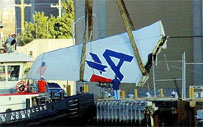 Daniel P Derella / Associated Press
Daniel P Derella / Associated Press
Whether this was an accident or an act of sabotage, the terror, the deaths were all too real. |
"Oh
my God," thought New York Mayor Rudy Giuliani as soon as he learned
that American Airlines Flight 587 had crashed in Rockaway, Queens, minutes
after it took off from JFK airport.
It was a reaction shared by the rest of the world, myself included. It was the same way I first heard about the World Trade Center attacks on September 11th: first thing in the morning, undressed and half-awake, staring at the TV in disbelief. |
|
| My
impressions on this morning were so jarred that I had a better memory of
the dream I had just a few hours earlier. I was revisiting the scenic
Trondelag region of Norway aboard a local bus, camera in hand. The bus
drove through several tunnels, passing one sublime coastal vista after
another until the passengers disembarked at the stop near the Nidaros
Cathedral of Trondheim. It was more than a dream; it was a real
experience.
I then had to remind myself that what happened on September 11th and November 12th were very real, too. Whether this was an accident or an act of sabotage, the terror, the deaths were all too real. My sister was worried. In five days, she was to drive me to LAX airport for my flight to Melbourne, Australia. She asked about my flight carrier (United), and my destination relative to Flight 587's scheduled landing at Santo Domingo, Dominican Republic (half a world away). Not that it made any sense, or should. For a moment, nothing else in the world – the Northern Alliance's imminent conquest of Kabul, the unsolved mystery over the four Anthrax deaths, the fate of Minnesota Twins and the Montreal Expos – mattered. Buildings and airplanes are not supposed to come crashing down when they're full of people. Yet they do, for one reason or another. It just is. |
||
14th November 2001: A Victory in Afghanistan
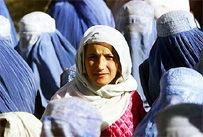 Yannis Behrakis / Associated Press
Yannis Behrakis / Associated Press
There will be no true respite in Afghanistan until its people regain an accountable government that rejects the evils of fanaticism. |
The Taliban have retreated to the mountains, abandoning most major cities. In the north and west, Mazar-i-Sharif, Herat, and the capital Kabul are in the hands of the Tajiks, Uzbeks and the Hazaras that make up the Northern Alliance. In the east and south, leaders of Pashtun tribes -- the Afghan majority -- lay siege to Jalalabad and Kandahar. | |
| The
Afghan civil war, enjoined by the United States to defeat Al-Qaeda and its
Taliban cohorts, is hardly over. In Mazar-i-Sharif, the first city
reclaimed by the Northern Alliance this year, reports of reprisal killings and lootings emerge.
Though there is much more calm in Kabul, factions within the Alliance are
already entrenching themselves along ethnic divisions within the capital, alarmingly restaging the events of 1995: as the communist regime fell, the
same groups from the north fought bitterly amongst themselves for the
spoils, killing 50,000 Kabulites until the Taliban swiftly took over on
the following year. A transition government, unifying all tribes and
to be overseen by United Nations, is far beyond the horizon.
Despite the volatility of these rapid developments, the people of Kabul are breathing a sigh of relief. For now, no more bombs, missiles and rockets are demolishing what remains of their battered city. Even more liberating, though, is the negation of the absurd medieval sanctions on daily life imposed by the Taliban's extreme interpretation of Sharia, or Islamic law. Shopkeepers play loud music, men shave their beards, children fly kites and a few women boldly reveal their (beautiful) faces. A Reuters headline said it all: "Afghan men indulge in death-free soccer," in reference to their freedom to play football, in short-sleeved shirts and shorts, on a field once reserved for public executions. There will be no true respite in Afghanistan until its people regain an enlightened, accountable government that rejects the evils of fanaticism. Until then, amid the Anthrax scare and the crash of yet another jet over New York, we can but vicariously sample the sweet taste of this early victory, in eager anticipation of the next good news: the capture of Bin Laden, Zawahiri and the other Al-Qaeda ringleaders. 25th August 2002: The War on Terrorism Has Gone Cold Upon the first anniversary of the attacks, al-Qaeda is uprooted from Afghanistan, the Taliban is overthrown, Mullah Omar and Osama bin Laden have eluded capture, and the US administration is pushing for the ouster of Iraqi leader Saddam Hussein. As the War on Terrorism increases its scope, it deserves some comparison with the last major global conflict of the twentieth century, the Cold War. A history lesson is in order, for the mistakes of the past are being repeated. Click here to read this essay in full. |
||